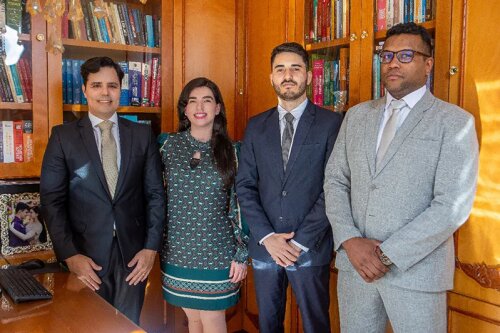Best Inheritance Law Lawyers in Goiânia
Share your needs with us, get contacted by law firms.
Free. Takes 2 min.
List of the best lawyers in Goiânia, Brazil
About Inheritance Law in Goiânia, Brazil
Inheritance law in Goiânia follows the federal Brazilian Civil Code, which governs succession, wills, and the transfer of assets after a death. In practice, Goiânia residents use both judicial and extrajudicial paths to settle estates, depending on whether disputes exist and whether all heirs are adults and in agreement. The city’s probate matters are typically processed through the Tribunal de Justiça do Estado de Goiás (TJGO) and local notaries for extrajudicial settlements.
Most Goiânia estates involve real estate located in Goiás and potentially other states. Planning ahead with a will or trust can simplify transfer of property and reduce delays. It is important to understand tax implications, especially the state tax known as ITCMD, which is managed by Goiás authorities and affects how assets are transmitted to heirs.
Key sources of law used in Goiânia include the national Civil Code, updates to civil procedure, and laws facilitating out-of-court settlements. These rules apply across Goiás and are interpreted by local courts in Goiânia and the TJGO.
In Brazil, inheritance and estate matters are primarily governed by the national Civil Code and related procedural laws, with state taxes playing a central role in determining the final net distribution to heirs.
For authoritative references to the core laws that shape inheritance practice in Goiânia, see the official government sources cited in the Local Laws Overview section below.
Why You May Need a Lawyer
Goiânia residents encounter specific scenarios where a solicitor specializing in inheritance law is essential. Below are concrete, real-world situations you might face in this region.
- Disputes among heirs over how a decedent’s Goiânia real estate is divided, especially when a farm or apartment complex sits in different districts of the city.
- Contesting or validating a will that was executed in Goiânia or another Brazilian state, including different will types such as public, closed, or holographic.
- Complex inventories with assets across Goiás and other states, requiring coordination of multiple probate courts and registries.
- Estate debts or creditors seeking payment before heirs receive portions, necessitating careful priority and order of payment planning.
- Executor or fiduciary challenges, including supervision of asset liquidation, tax payment, and distribution to heirs in Goiás.
- Intent to pursue an extrajudicial settlement at a notary in Goiânia, when all heirs are adult, there are no debts owed to creditors, and no minor or legally incapacitated heirs exist.
A skilled attorney can help you determine whether a judicial or extrajudicial route is appropriate, prepare the required documents, and navigate local procedures with the appropriate registry offices and notaries.
Local Laws Overview
Brazilian inheritance law is national, but Goiânia works within state specifics such as ITCMD taxes and local probate practices. Here are 2-3 key laws and regulations that govern inheritance in Goiânia and across Goiás.
- Código Civil (Lei nº 10.406, de 10 de janeiro de 2002) - This is the main statute governing succession, heirs, testaments, and partilha. It defines forced heirs and typical rules for intestate succession and testamentos.
- Lei 11.441/2007 - This law introduced the possibility of an inventário extrajudicial (out-of-court settlement) when all heirs agree and there are no minors or incapacitated heirs, allowing public notary involvement in Goiás and elsewhere.
- Lei nº 13.105/2015 (Novo CPC) - Reforms to civil procedure, including procedural timelines, evidence, and appeals in probate cases, affecting how Goiás courts handle inventários and related matters.
Practical note for Goiânia: ITCMD is a state tax collected by Goiás, with rates and rules set by the state treasury. Consult the Goiás Secretaria da Fazenda for current guidance on ITCMD rates and filing requirements.
Useful official references for these laws include Planalto's government portals for federal laws and TJGO for local probate procedures. The civil code and related statutes are accessible here: Código Civil (Lei n° 10.406/2002), Lei n° 11.441/2007, Lei n° 13.105/2015 (Novo CPC), and local Goiás information at TJGO and SEFAZ GO.
Frequently Asked Questions
What is inheritance law in Goiânia about?
Inheritance law in Goiânia covers how assets are transferred after death, who inherits, and how to handle wills and estates through courts or notaries.
Key steps include determining heirs, identifying assets, and choosing between judicial or extrajudicial processes depending on disputes and consents.
How do I start a probate in Goiânia?
You typically file a patimento with the appropriate probate court at TJGO or begin an extrajudicial settlement at a notary if eligible. Gather death certificate, will, and asset data first.
When should I hire a Goiás inheritance lawyer?
Hire a lawyer when there are disputes among heirs, debts in the estate, real estate transfers, or you are planning an extrajudicial settlement and need notary guidance.
Where can I file an inventory in Goiás?
Judicial inventories are filed with the TJGO courts. Extrajudicial settlements are prepared at a public notary in Goiânia, with follow-up registration.
Why might extrajudicial inventory be better in Goiânia?
Extrajudicial inventories avoid court delays if all heirs consent and no minor heirs exist, typically speeding up the distribution of assets.
Can I do an inventory extrajudicial in a notary in Goiânia?
Yes if all heirs are adults, there are no outstanding debts to creditors, and there is no dispute among heirs or minor or incapacitated heirs.
Should I hire a lawyer if all heirs agree?
Even with agreement, a lawyer helps ensure the extrajudicial process complies with law, handles taxes, and oversees accurate asset transfer documentation.
Do I need a Brazilian attorney if I live abroad?
Yes. You should engage a local attorney in Goiânia to coordinate with Brazilian authorities, especially for real estate and tax issues in ITCMD.
Is a will required for all estates?
No. Some estates go through intestate succession when there is no will. A will clarifies your wishes and often reduces disputes.
How much does probate cost in Goiás?
Costs vary by case complexity, court fees, notary charges, and attorneys’ fees. Extrajudicial settlements may cost less when straightforward.
What documents are needed to open an inventário in Goiânia?
You typically need death certificates, identification documents, proof of property ownership, tax records, and any existing will or testamentary documents.
How long can a judicial inventory take in Goiás?
Judicial inventories in Goiás vary by complexity and court workload, often spanning several months to over a year in contested cases.
What is ITCMD and who pays it?
ITCMD is a state tax on inheritances and donations. The estate or heirs generally bears the tax, with liability depending on relationship and asset value.
Additional Resources
Access these official sources for authoritative guidance and procedures related to inheritance law in Goiás and Brazil:
- Tribunal de Justiça do Estado de Goiás (TJGO) - Official court authority for Goiás; handles judicial inventories and probate matters. https://www.tjgo.jus.br
- Ministério Público do Estado de Goiás (MPE-GO) - Public prosecutors’ office supervising guardianship, rightful distribution, and protection of heirs’ rights during probate. https://www.mpgo.mp.br
- Secretaria da Fazenda do Estado de Goiás (SEFAZ-GO) - State tax authority that administers ITCMD and provides guidelines for inheritance tax reporting and payment. https://www.sefaz.go.gov.br
- Ordem dos Advogados do Brasil - Seção Goiás (OAB-GO) - Professional body that can help you locate qualified solicitors and check credentials. https://www.oabgo.org.br
Next Steps
- Clarify your goals and the desired outcome for the estate in Goiânia. Decide between an extrajudicial settlement or a judicial inventory based on heirs and asset complexity.
- Gather key documents and information before contacting a lawyer. Collect death cert, wills, property deeds, and creditor notices.
- Check if extrajudicial settlement is possible by confirming all heirs are adults and no debts remain. If yes, plan a consultation with a public notary in Goiânia.
- Search for a lawyer who specializes in inheritance law in Goiânia. Use OAB-GO's directory and verify experience with Goiás probate matters.
- Schedule a formal consultation and prepare a written engagement agreement outlining fees, scope, and timelines.
- Assess tax implications with ITCMD guidance from SEFAZ-GO and prepare tax filings early to avoid delays.
- Begin the chosen process promptly, with your attorney coordinating with TJGO or the notary, depending on the pathway.
Lawzana helps you find the best lawyers and law firms in Goiânia through a curated and pre-screened list of qualified legal professionals. Our platform offers rankings and detailed profiles of attorneys and law firms, allowing you to compare based on practice areas, including Inheritance Law, experience, and client feedback.
Each profile includes a description of the firm's areas of practice, client reviews, team members and partners, year of establishment, spoken languages, office locations, contact information, social media presence, and any published articles or resources. Most firms on our platform speak English and are experienced in both local and international legal matters.
Get a quote from top-rated law firms in Goiânia, Brazil — quickly, securely, and without unnecessary hassle.
Disclaimer:
The information provided on this page is for general informational purposes only and does not constitute legal advice. While we strive to ensure the accuracy and relevance of the content, legal information may change over time, and interpretations of the law can vary. You should always consult with a qualified legal professional for advice specific to your situation.
We disclaim all liability for actions taken or not taken based on the content of this page. If you believe any information is incorrect or outdated, please contact us, and we will review and update it where appropriate.









